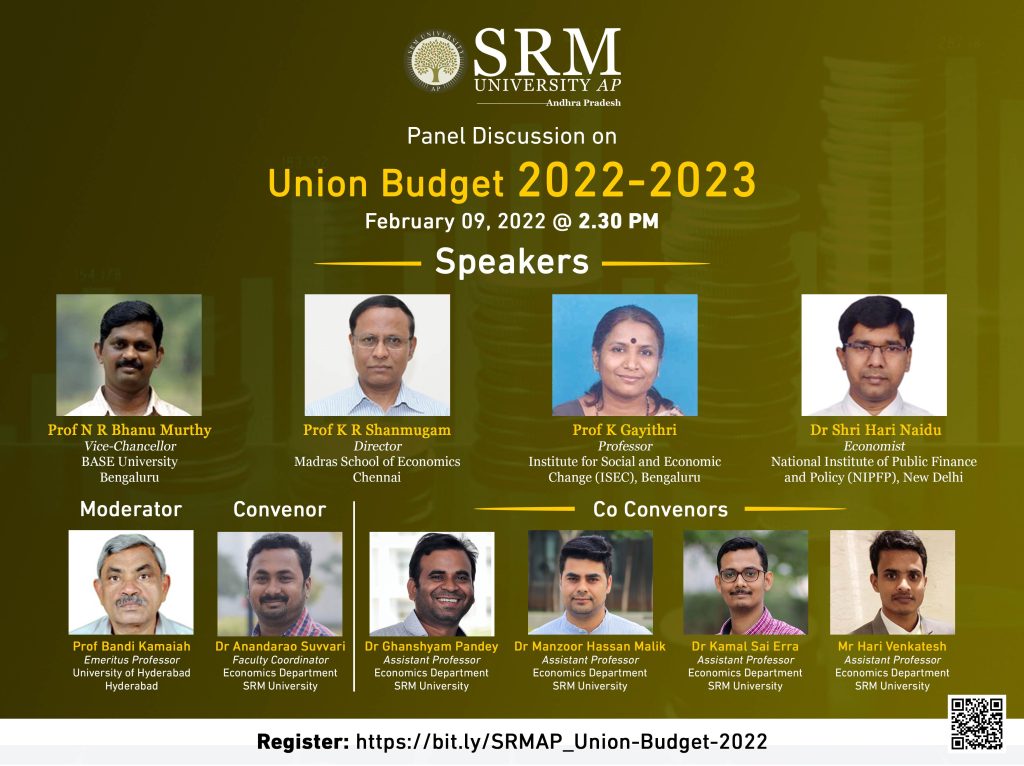 The Department of Economics of SRM University-AP, Andhra Pradesh, conducted a Panel Discussion on February 09, 2022, for the much needed and relevant in-depth analysis of the Union Budget proposed by the Finance Minister in the parliament on February 01, 2022.
The Department of Economics of SRM University-AP, Andhra Pradesh, conducted a Panel Discussion on February 09, 2022, for the much needed and relevant in-depth analysis of the Union Budget proposed by the Finance Minister in the parliament on February 01, 2022.
Professor Bandi Kamaiah was the moderator of the event, and Dr Anandarao Suvvari, the faculty coordinator of the Department of Economics in the University, organised this discussion, inviting four eminent public finance economists of India, Prof N R Bhanu Murthy, Vice-Chancellor, BASE University, Bengaluru; Prof K R Shanmugam, Director, Madras School of Economics, Chennai; Prof K Gayathri, Professor, Institute for Social and Economic Change (ISEC), Bengaluru; Dr Shri Hari Naidu, Economist, National Institute of Public Finance and Policy (NIPFP), New Delhi. The co-convenors of the event were Dr Ghanshyam Pandey, Dr Manzoor Hassan Malik, Dr Kamal Sai Erra, Dr Hari Venkatesh from the Department of Economics SRM-AP.
The discussion started with a brief overview and essence of the Union budget by Dr Anandarao Suvvari, followed by Prof Bandi Kamaiah. Then first panellist Prof N R Bhanu Murthy, who our Indian Finance Minister also quoted, spoke about how the current budget is a continuation of the previous budget and emphasised more on the capital expenditure, which is the route to growth. He highlighted that the government should bring efficiency in public expenditure and expressed that the public policymakers side-lined the public debt number to GDP ratio at both central and state levels. An issue identified by Prof Murthy was bringing in many commodities under the customs tariff line and how doing this will have a negative impact on the exports. Further, he mentioned the ignorance towards the health and education sectors by a reduction in the allocation of expenditure for the same.
The second panellist Prof K R Shanmugam, gave a very detailed look at the budget, sector by sector, pointing out the benefits and the concerns related to each of them. He gave us a brief look at how the Indian economy has been doing for the past few years and gave an analysis taking this into consideration and stated that the budget had provided necessary fiscal stimuli through an increase in capital expenditure for the revival of the economy.
The third panellist Prof K Gayathri highlighted the philosophy of policy implications of budget and the need for a continuous process for analysing it. She also focused on the need for scientificity for estimates and the need for a sustainable approach for the budget. She pointed out that the current budget was future-looking in line with the vision for India 100 and that it put thorough emphasis on capacity building inclusive development by involving all stakeholders and modern infrastructure while expressing concern over effective implementation of policies.
The final panellist, Dr Shri Hari Naidu, discussed the revenue side of the budget thoroughly while focusing on the new taxation regime, other and legitimising crypto assets and digital Indian currency. In addition to this, Dr Naidu commented on the budget that the tax GDP ratio has been stagnant for the past two decades also, it has not been addressed in the budget, and despite the fact that there were a lot of tax reforms, the tax bases needed to be expanded.
After individual reviews by the panellists, questions posed by the students and the co-convenors were answered, followed by an interactive and engaging discussion among panellists, moderator, convenor and co-convenors on various issues spanning from the way of analysing the budget, trade-offs between debt and capital expenditure, debt sustainability, control mechanisms, the process of allocation, outcome evaluation or impact of the budget and the need for reality and effectiveness of planned budget on the ground level.
The session, after a thorough discussion on the union budget, was concluded by a vote of thanks proposed by Asst. Prof. Dr Hari Venkatesh to the esteemed panellists, moderator, convenor, co-convenors and all the people who made this session successful for contributing their precious time and valued efforts.

